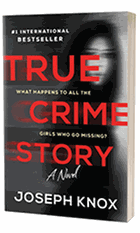
In the aptly titled True Crime Story, crime novelist Joseph Knox plays a teasing, clever game of story-within-a-story. The book is not quite autofiction, not quite noir and certainly not documentary, yet it draws heavily from each subgenre as it assembles a mystery plausible enough to unsettle. Knox presents his latest--his first stand-alone novel after wrapping up the Aidan Watts trilogy--as if it were a genuine true-crime manuscript, inserting himself as a character amid a heap of interview transcripts, e-mails and mysterious documents. Never is the reader meant to entirely trust the author: the first line of an introductory "publisher's note" reads: "This amended second edition of True Crime Story includes wider context on the previously undisclosed role of Joseph Knox in the narrative, as well as his response to various allegations raised in the press."
Immediately, readers are wary of this Knox fellow, which is perhaps the greatest fun of True Crime Story. The audience is as irritated with this unreliable character as they are charmed by the actual author, whom they know is gleefully pulling the wool over their eyes. None of it's real. Perhaps some of it is real. Welcome to the Matrix of crime fiction, mayhap?
In True Crime Story, the central mystery is (purposefully) one familiar to readers: a young, pretty white girl goes missing. In December 2011, 19-year-old Zoe Nolan, a Manchester University student, walks out of a party and is never seen again. Seven years later, she still has not been found--dead or alive--and though many remember her face from the news, the case is on a block of ice. The friends who knew her then--her suspicious sister, Kimberly; a coursemate, Fintan Murphy; another friend, Jai Mahmood; her flatmate, Liu Wai; and her toxic boyfriend, Andrew Flowers--sit for interviews with Evelyn Mitchell, a floundering writer looking for a new idea. Enveloped in Zoe's story and convinced she's found something remarkable within the pages and pages of material, Evelyn is sucked deeper into the mystery until she finds herself an unwitting part of it. As she investigates, she e-mails Knox, whom she had met at an author event, asking for his opinion.
Inconsistencies arise constantly within the alibis and anecdotes surrounding Zoe's case, which Evelyn finds troubling enough. But then a real danger arises, threatening Evelyn's safety and coaxing Knox himself further into the tale. Readers won't finish the book liking the fictional Knox much, but that's part of the real-life Knox's game.
In some senses, True Crime Story is exactly that: a strategy, a cheeky experiment, a toy the author is using to test his own wits. It is a notable book largely because it is a conceptual one. Yet it is also, at its best, a full-throated critique of the ways in which the true-crime fad treats victims, in particular young women, and the dangers the world fails to acknowledge when these crimes happen. The conceit is a dissection of the definition of truth; the jab is in the title itself. Who decides what is true? And who has the power to label what is a crime and what goes ignored? Who do we forgive most easily? And, perhaps most titillating: Why do we care so little and so much at the same time? True crime has become one of entertainment media's most lucrative operations. Yet there's no denying it is a profit powered by tragedy, and often preventable ones at that.
True Crime Story relies heavily on dialogue from Evelyn's interviewees. Knox does a masterful job interspersing their snips of conversation to reveal troubled dynamics and to shift the reader's ire from one subject to the next. The oral history form is an ideal fit for a crime novel, as it reveals just how easily inconsistencies arise to throw a case into confusion. Facts never feel finalized. The least suspect characters can quickly become the prime ones with a single errant word. Such possibilities mean readers will tear through True Crime Story, never sure of what they think they know. If the book were any less of a page-turner, that unreliability would be exhausting. But Knox makes it fun.
The final reveal is a climax that appropriately shocks but might frustrate readers who deem themselves detectives. This denouement is part of Knox's strategy. At no point is the reader allowed to feel as if they're standing on solid ground; shiftiness is how Knox proves his point.
True Crime Story is a refreshing, unexpected entry in a perhaps tired genre of cops and robbers, missing girls and their terrible fathers and boyfriends. It takes a loupe to storytellers' own role in the creation of a true-crime phenomenon, then zooms out to examine the wide-ranging aftershocks. Joseph Knox shows us there are no winners and losers in true crime, even when the case is cracked. There is only the tragedy, and the terrible, confusing pleasure we get from picking it apart. --Lauren Puckett

